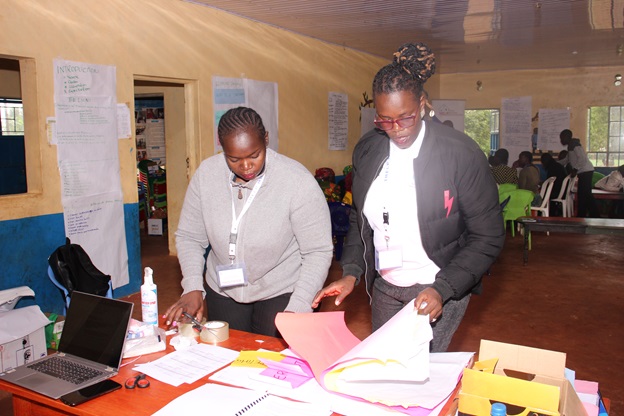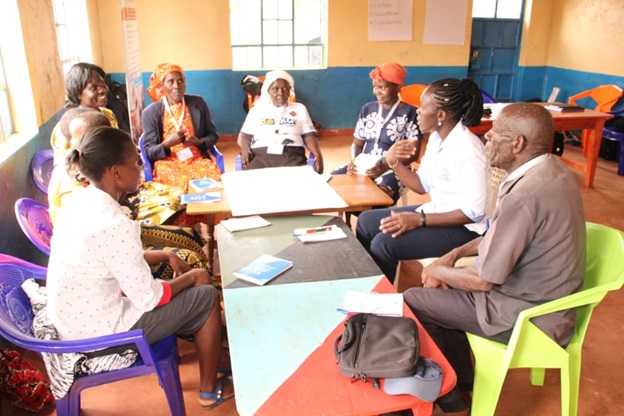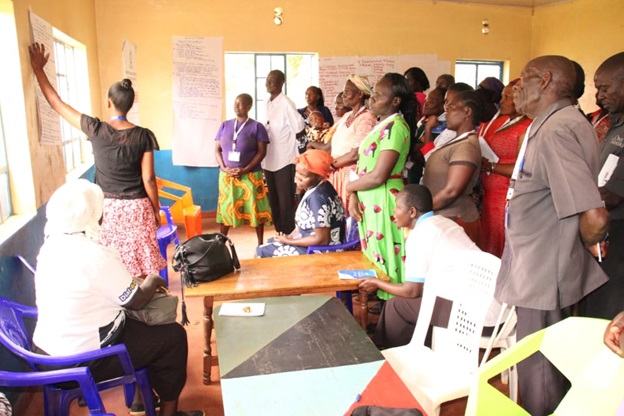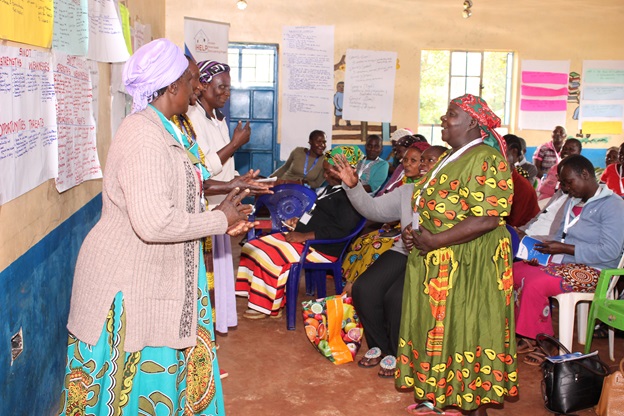MMUST researcher, Dr. Rose Opiyo, has once again taken the lead to equip children’s caregivers with skills in the established iHELP centres supported by her project. This was recently exhibited during a two-day Training of Trainers workshop held on 21st and 22nd April 2022 at the Idakho Central Centre in Ikolomani Sub-county. The aim of this training was to equip caregivers with diverse skills in responsive caregiving and income generation activities to ensure sustainability of the project. This informative workshop was officially opened by the Associate Dean, School of Education, Prof. Kennedy Bota.

Dr. Rose Opiyo (Seated, second from the left) and Associate Dean, School of Education, Prof. Kennedy Bota (Seated, third from right together with participants at the training workshop.
iHELP is a hybrid of Home Based and Centre Based ECD models which caters for all children including those with disabilities. The training was facilitated by Mr. Steve Ikonya and Ms. Martina Adega who took the participants through various aspects related to responsive care giving and income generating activities. They stressed on the need to come up with a routine in the Centres to guide children daily activities.
 Participants during group discussions
Participants during group discussions
Speaking during the workshop, Dr. Opiyo noted that the project is set to ensure proper upbringing, children stimulation, safety and good nutrition to all children including those living with disabilities.
“We have had a productive session with the project advisors. I want to appreciate the duo for the great work they have done to empower the caregivers and centre managers on responsive caregiving,” said Dr. Opiyo.
Mr. Martin Shivachi, one of the community members who attended the training attested to the massive impact that iHELP project has had on the community. He noted that the inclusive aspect of this project has ensured that children living with disabilities get equal opportunities.
“With this kind of training, caregiving will not remain to be mothers’ responsibility but a collective role to both parents. This project should be overblown to the national levels to tap into these resources. I urge you to take this knowledge to the community,” added Mr. Shivachi.
 A presentation by community members at one of the sessions
A presentation by community members at one of the sessions
His words were echoed by another workshop participant who is also one of the iHELP center managers, Ms. Grace Ndiva who appreciated the MMUST researcher for endeavoring to support the Isulu community through the project. Additionally, Ms. Ndiva reiterated that they have learnt on responsive feeding, caregiving, proper nutrition and income generating activities which will certainly improve the livelihoods of their children.
Some of the topics extensively addressed during the training included ‘Myths and Misconceptions Affecting Responsive Caregiving’, ‘Characteristics of a Responsive Caregiving Environment’, ‘Provision of Inclusive Care in the Community’, ‘Competencies of a Caregiver’, ‘Changes that Occur During Various Developmental Stages of a Child’, ‘Identifying When There is any Form of Developmental Delay During a Child’s Growth’ and ‘Early childhood Development, Nurturing Care Framework.’
 iHELP project Caregivers during a group discussion.
iHELP project Caregivers during a group discussion.
This comprehensive training has left caregivers and centre managers fully equipped with skills, knowledge, values, attitude and resources to ensure effective management of the Centres. The project is set to create learning platforms for the community. This will help to build the capacity of caregivers and deepen collaborations in a bid to achieve the objectives of the program.


